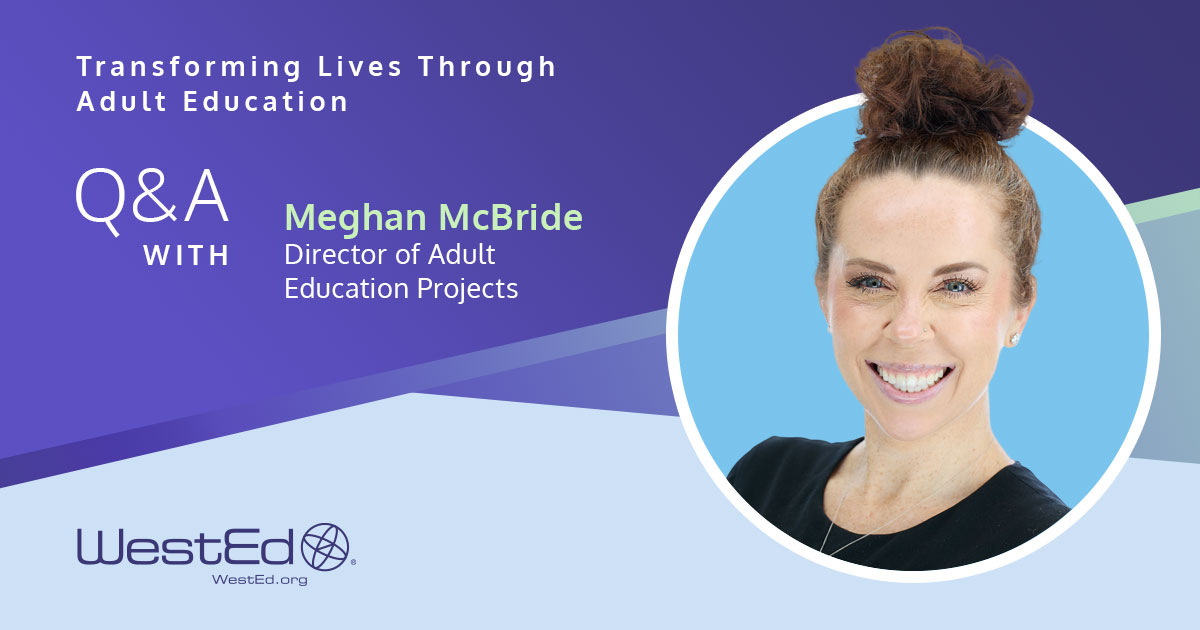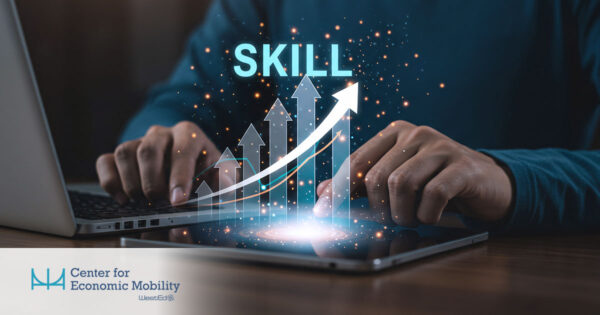
July 17, 2025
Adult education is an often-overlooked engine for economic mobility in communities across the country. With approximately 1.1 million people enrolled nationally, adult education programs offer pathways to earn a high school equivalency (HSE) or diploma (HSD), learn English, build literacy skills, or gain vital job training.
In this Q&A, Meghan McBride, Director of Adult Education Projects with the Center for Economic Mobility at WestEd, offers a unique perspective from her personal journey and career in adult education, discussing how these programs can transform individual lives while creating profound ripple effects in families, communities, and local economies.
Before McBride joined WestEd, she served as Vice President for Adult Education at Georgia Piedmont Technical College, the second largest adult education program in the state, where she oversaw Adult Basic Education, English as a Second Language (ESL) , and numerous job training programs for adult learners. In her role at WestEd, she helps strengthen and support adult education programs across the country to better serve adult students.
Read the Q&A for insights on the role adult education programs play in communities, lessons learned from McBride’s career, and the ways in which WestEd approaches serving adult education students and programs.
Note: This conversation has been edited for length and clarity.
Adult education is simply education for adults who are often left out of traditional systems.
Students in adult education come from all walks of life. Many of them are immigrants who are learning English and maybe a second, third, fourth, or fifth language. Others may have dropped out of high school and are returning to finish after years out of school. Some adult education students are parents who are trying to help their kids with homework, and some are individuals who are incarcerated or formerly incarcerated and are looking to rebuild their lives.
Adult education programs offer a range of supports. Programs offer ESL classes and HSE or diploma preparation classes. They also provide job training, digital literacy, and support for transitioning adult education students to college or career after they exit the program.
Adult education programs help communities in a major way. Adults who complete an adult education program—like finishing ESL, earning their GED or HSD, or completing a job training program—often continue their education in a postsecondary program or go on to use their skills or knowledge to retain better paying jobs. We also know from the research that adult education students often become more involved with their children’s education, whether that’s being able to better support their child’s literacy development after completing English language classes or helping instill the importance of education in their children.
The impact adult education programs have on individuals can create a ripple effect throughout communities: by improving the economic mobility of our students, we’re also helping local economies and communities become more stable and resilient by strengthening the workforce.
This work is deeply personal for me. I dropped out of high school when I was 16 years old, and I enrolled in a local GED preparation program. That experience changed the trajectory of my life. In just a few months after enrolling, I earned my GED. Then, I enrolled in college, and from there I built a career in education that led me to where I am today working at WestEd.
When working with adult learners now, I can see myself in them. I know what it feels like to be where they are—whether they’re starting over or starting from scratch like I was.
I know how powerful it is when teachers in these programs see your potential and help you transform your life. That’s why I’m passionate about what we do to strengthen and support these [adult education] programs—because they gave me a second chance, and I want to make sure that others have that same opportunity regardless of where they’re starting from.
One thing I’ve learned is that the transformation doesn’t always look dramatic or immediate. Sometimes [the transformation] is quiet and deeply personal and may take a while.
It’s more than just building foundational skills for adult learners. [Adult education programs] can help restore dignity for the students. I’ll share my experience with that. When I dropped out of high school, I carried a stigma and the shame of being a high school dropout for many years.
Even after I got my GED and went to college, that stigma stuck with me. It took many years, and a lot of unlearning, to recognize that my path wasn’t something I should be ashamed of, and, instead, it was something I should be proud of.
That experience shapes how I approach the work now. When I was an [adult education] practitioner, I saw how that stigma still shows up for so many students and how powerful it is when they release the stigma and replace that with pride.
When I was an administrator, I supported a student who had dropped out of high school and came to our program to prepare for the GED exam. While she was enrolled in our program, she also enrolled in our Commercial Driver’s License (CDL) training program because she needed a job.
Every night before she came to school in the morning, she worked delivering food with her 2-year-old daughter asleep in the back seat of her car. It was heartbreaking, but also inspiring, to see what she was doing every day to improve the lives of both her and her daughter.
She went on to earn her GED and passed the CDL exam, earning a Class A driver’s license. She was able to get a job in the field, and now she’s driving locally for a trucking company and is able to be home with her daughter every night. These are the life-changing transformations that adult education makes possible.
At WestEd, we approach adult education with both a system lens and a human lens. On the one hand, we work with practitioners and programs to strengthen the systems that serve adult learners. This includes things like curriculum alignment and development to strengthen instruction and the use of data and strategic planning to improve programs for learners.
On the other hand, as former adult education practitioners ourselves, we always remember that there are real people behind the numbers, and these are human beings who are navigating work, family, and school—and often all of those at once.
A big part of our work happens at the intersection of adult education and workforce development. We design student-centered training programs that connect directly to in-demand jobs in the regions where adult education programs exist and our students live.
Ultimately, we’re building bridges between education and employment, between policy and practice, and between where students are and where they want to go.
Learn more about WestEd’s approach to serving adult learners, and explore how you can help strengthen pathways to economic opportunity through a partnership with the Center for Economic Mobility at WestEd.










